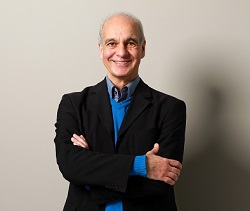- Speaker
- Prof. Dr. Sebastian Eggert
- RPTU University of Kaiserslautern-Landau, Germany
- Abstract
One-dimensional quantum wires have fascinated physicists both as a prototypical many-body model for a Luttinger liquid and as a technological necessity in the ultimate limit of miniaturization. We first give a pedagogical introduction to the theoretical background of bosonization and the non-linear generalization to Luttinger liquids. This talk will then address the straight-forward question about how a right-moving unit charge propagates along an interacting spinless wire. Using adaptive time-dependent DMRG, we observe that the charge spontaneously separates into three distinct parts: a fractional charge with free particle dynamics and left- and right-moving parts. As we will show the results are in full agreement with the non-linear Luttinger theory and provide deep insights into the universal correlated nature of these emergent particles. Corresponding out-of-equilibrium transport measurements offer a direct method to extract the interaction parameters governing correlations in the system even at higher energies.
Reference:
[1] Phys. Rev. Lett. 133, 086502 (2024).
- About the Speaker
Sebastian Eggert is a distinguished professor at Technische Universität Kaiserslautern in Germany. He earned his M.Sc. in Physics (1990) from the University of Wyoming, USA, and went on to obtain his Ph.D. in Physics (1994) at University of British Columbia in Canada, working with the renowned Prof. Ian Affleck. Following his doctorate, he held a postdoctoral fellowship at Chalmers University of Technology in Sweden (1994~1996). He then served as an Assistant Professor (1994~1997) before being promoted to Associate Professor and Fellow of the Swedish Research Council (1998~2004). Since 2004, he has been a full professor at Technische Universität Kaiserslautern. His research interests focus on many-body quantum phenomena in low-dimensions, where strong correlations dominate the collective behavior and give rise to universal properties and fascinating physical phenomena. He currently explores dynamic effects in these systems. By integrating field theoretical methods with advanced numerical simulations, his works provide detailed comparisons with experimental results.
- Date&Time
- 2025-04-18 10:00 AM
- Location
- Room: A303 Meeting Room




